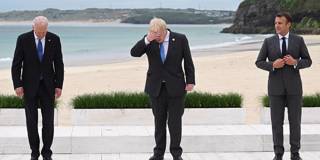In their new security and technology arrangement with Australia, America and Britain have achieved tactical gains at the expense of strategic goals in the Indo-Pacific. In fact, given how deeply the deal has divided the West, the biggest long-term winner may well be China.
BERLIN – The geopolitical story of the last few years has featured Western democracies’ gradual awakening to the realities of an increasingly ambitious and authoritarian China. European countries have gone from competing with each other to be China’s best friend to sharing the view that China represents a profound, multifaceted challenge.
For example, on global issues such as climate change, European governments must now find a way to work effectively with a difficult partner. On economic and technological issues such as artificial intelligence, China has emerged as a fierce competitor. And on human rights, democracy, and the role of the state in the economy, it is now seen as a “systemic rival.”
In addition to becoming more realistic about China, Europeans are also becoming more engaged with Asia. France led the pack in 2016 by signing a deal to provide Australia with its diesel-powered Barracuda submarines, and by inspiring the rest of Europe to develop a new strategy for the Indo-Pacific. Its position on China in recent years has been light years away from that of British Prime Minister Tony Blair, French President Jacques Chirac, and German Chancellor Gerhard Schröder, who supported ending a European Union embargo on arms sales to China and granting that country “market economy status.”

BERLIN – The geopolitical story of the last few years has featured Western democracies’ gradual awakening to the realities of an increasingly ambitious and authoritarian China. European countries have gone from competing with each other to be China’s best friend to sharing the view that China represents a profound, multifaceted challenge.
For example, on global issues such as climate change, European governments must now find a way to work effectively with a difficult partner. On economic and technological issues such as artificial intelligence, China has emerged as a fierce competitor. And on human rights, democracy, and the role of the state in the economy, it is now seen as a “systemic rival.”
In addition to becoming more realistic about China, Europeans are also becoming more engaged with Asia. France led the pack in 2016 by signing a deal to provide Australia with its diesel-powered Barracuda submarines, and by inspiring the rest of Europe to develop a new strategy for the Indo-Pacific. Its position on China in recent years has been light years away from that of British Prime Minister Tony Blair, French President Jacques Chirac, and German Chancellor Gerhard Schröder, who supported ending a European Union embargo on arms sales to China and granting that country “market economy status.”